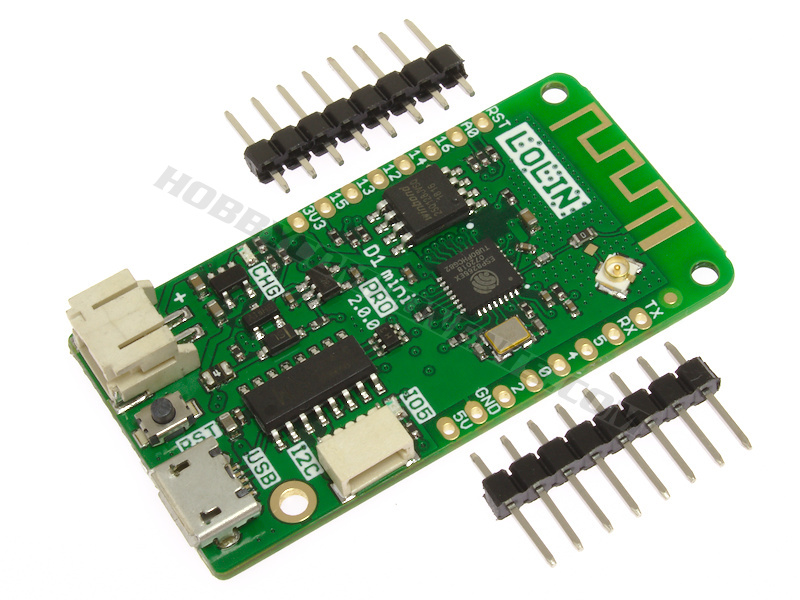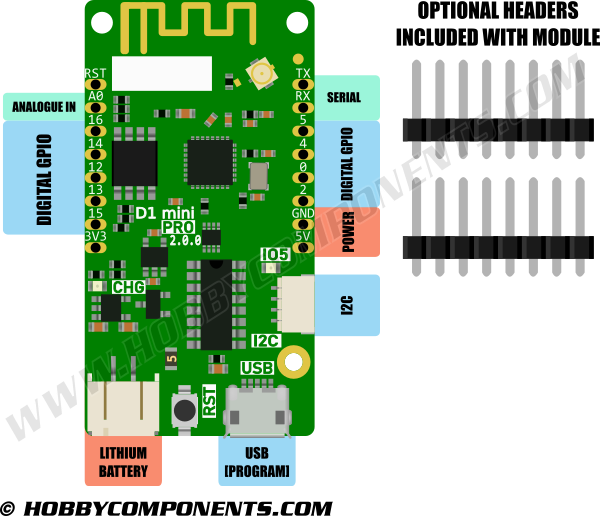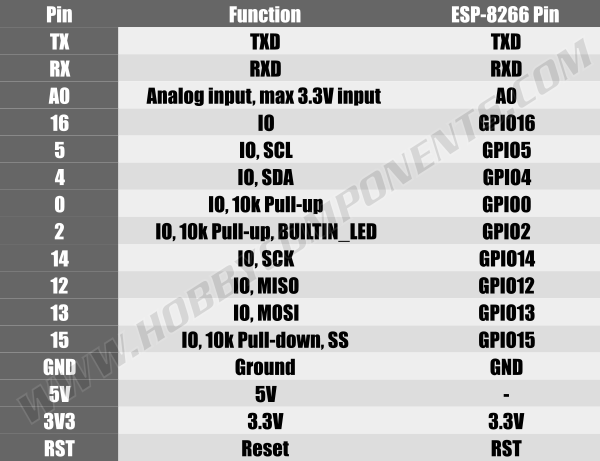Wemos Lolin D1 Mini Pro V2 (HCWEMO0018)
Posted: Tue Aug 07, 2018 3:06 pm


The WeMos D1 mini PRO is a miniature wireless 802.11 (Wifi) microcontroller development board. It turns the very popular ESP8266 wireless microcontroller module into a fully fledged development board. Programming the D1 mini pro is as simple as programming any other Arduino based microcontroller as the module includes a built in microUSB interface allowing the module to be programmed directly from the Arduino IDE (requires the ESP8266 support to be added via board manager) with no additional hardware.
The D1 mini Pro is also designed to allow Wemos compatible shields to be plugged into the board in a similar way to the Arduino development board platform, which greatly expands its capabilities. There is already a large range of compatible shields available and these can also be purchased via our website.
New V2.0 features: This version now includes a lithium battery charging circuit (500mA max) and header which allows the module to be powered from a 3.7V single cell lithium battery.

Features:
11 digital input/output pins
Interrupt/pwm/I2C/one-wire
1 analog input(3.2V max input)
16M bytes(128M bit) Flash
External antenna connector
Built-in PCB antenna
Lithium battery interface, 500mA Max charging current
LOLIN I2C Port
Compatible with Arduino, MicroPython, NodeMCU
Operating Voltage: 3.3V
Digital I/O Pins: 11
Analog Input Pins: 1(Max input: 3.2V)
Clock Speed: 80MHz/160MHz
Flash: 16M bytes
Length: 48mm
Width: 25.4mm
Weight: 4.5g
Pinout:


Drivers
The Wemos D1 mini includes a CH340 USB to UART IC to allow it to be programmed directly from the USB port of a computer.
USB 32/64 bit drivers for Microsoft Windows computers can be downloaded from our Github page here:
https://github.com/HobbyComponents/CH340-Drivers
Windows Installation Instructions
Drivers are available in the link below. Simply download and unzip them, connect your D1 Mini to your computer with a USB cable and when the new hardware is detected, point the wizard to the folder you just unzipped to and it should install without any problems.
Windows Driver here
MAC installation instructions
New code signed version confirmed to work with 10.12 Sierra
Download the driver (you must be logged in to download).
Once downloaded, double-click the zip file to unzip it.
Run installer found in that folder.
If asked to restart, do not restart just yet.
Now restart your Mac.
Adding board support to the Arduino IDE
Latest versions of the Arduino IDE allow for adding additional 3rd party board support directly from within the Arduino IDE. To add support simply open up your Arduino IDE and follow these steps:
1) Go to File->Preferences
2) In the window that opens up find the text box labeled 'Additional Boards Manager URLs:' and paste the following line into it:
http://arduino.esp8266.com/stable/packa ... index.json
Then click the OK button to close the window.
3) Next go to Tools->Board->Boards Manager
4) In the window that opens up look for the entry titled 'esp8266 by ESP8266 Community Version x.x.x' and click on it.
5) In the bottom right-hand corner of this entry you should now see an install button appear. Click on this and board manager will then automatically add all the files necessary to support the ESP8266. This may take a few minutes depending on the speed of your internet connection.
6) Under tools->board you should now see additional board options for various ESP8266 devices including one called 'WeMos D1 mini Pro'.
Schematic:
Disclaimer: Libraries, example code, and diagrams are provided as an additional free service by Hobby Components and are not sold as part of this product. We do not provide any guarantees or warranties as to their accuracy or fitness for purpose.
Descriptions and diagrams on this page are copyright Hobby Components Ltd and may not be reproduced without permission.